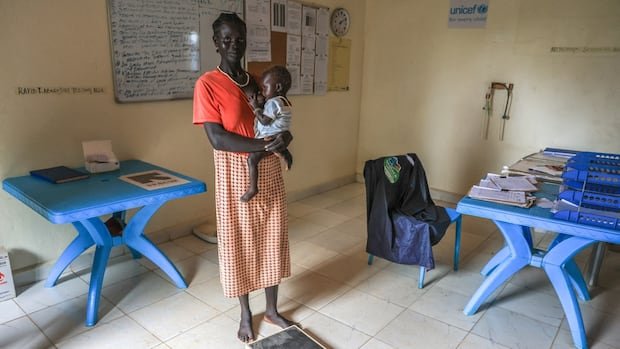Mary Abdullah rushed her 13-month-old daughter, Jote, to Bunj Hospital in northern South Sudan, fearing the worst. Jote, weighing only five kilograms, was battling anemia and malnutrition, a common plight among underweight infants in the country. Abdullah, who supports her family by collecting firewood, made a challenging seven-kilometer trek from her home in Maban County to the hospital, losing days of income in the process.
Upon arrival, Abdullah discovered that due to reduced funding from the U.S. through UNHCR, the hospital had experienced a slowdown in medication deliveries and a halving of nursing staff. This resulted in a shortage of milk for Jote, adding to the already dire situation for many families in South Sudan.
The country heavily relies on oil exports for its government revenue, but factors like corruption, civil unrest, neighboring conflicts, and natural disasters have left most of the population dependent on foreign aid. The UN reports that over 70% of South Sudan’s population, totaling nine million people, require some form of external assistance, exacerbating the current hunger crisis.
The U.S. aid cuts, amounting to around 40% of the country’s aid, have had a significant impact. President Donald Trump’s decision to halt foreign aid programs and the subsequent closure of USAID have left many vulnerable to diseases like malnutrition, tuberculosis, and malaria.
At Bunj Hospital, staff shortages and dwindling medical supplies have put lives at risk. Nurses, doctors, and support staff, unpaid for six months, went on strike, leaving essential wards unattended. The situation reflects the broader struggle faced by healthcare workers across South Sudan, who support large extended families with their salaries, heavily reliant on foreign aid contributions.
Local NGOs have suffered immensely from the aid cuts, with many organizations forced to shut down operations since March. The TiTi Foundation lost millions in funding channeled through UNICEF, impacting crucial initiatives like job creation, education, and food security. The loss of support has had a ripple effect, affecting refugees from neighboring Sudan and internally displaced persons in South Sudan.
The economic crisis, climate-related challenges, and ongoing ethnic tensions have compounded the country’s woes. The unstable political climate, fragile peace agreements, and recent outbreaks of violence have further strained resources and aid efforts, pushing more people into poverty and hunger.
Aisha Ajab, a resident of Doro refugee camp, exemplifies the struggle faced by many. Despite working to make ends meet, she finds it increasingly difficult to feed her family, mirroring the growing economic hardship that has engulfed the majority of South Sudan’s population.
As the country grapples with these challenges, humanitarian workers stress the urgent need for sustainable solutions beyond aid dependency. The current crisis underscores the policy failures and systemic issues that have perpetuated South Sudan’s reliance on external support, highlighting the necessity for long-term solutions to break the cycle of vulnerability and instability.

